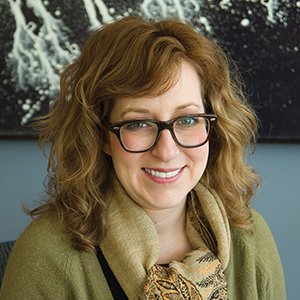Publishing pros at your disposal
The editorial team at the American Society for Biochemistry and Molecular Biology works with researchers to disseminate their newest findings pretty much all day every day. Editors, reviewers, writers and others on the team know the ins and outs of data acquisition and presentation, wordsmithing, and promoting findings to the scientific community and beyond.

At Discover BMB, the ASBMB annual meeting, in Seattle in the spring, the editorial team will present a 60-minute workshop designed to give authors a competitive advantage — and preserve the integrity of the scientific record.
Scientific and technical editors and other staffers who support the Journal of Biological Chemistry, the Journal of Lipid Research and Molecular & Cellular Proteomics will offer advice for (a) collecting, storing and presenting data; (b) editing text for clarity and reach; and (c) sharing your work.
Figures first
The workshop will begin with a presentation of best practices for data acquisition and presentation. While purposeful figure manipulation makes headlines, it’s important to us to help curb honest mistakes. After all, your — and our — reputation is on the line.
First you’ll learn about the software and settings you should use to capture the data you wish to present in your paper. If you want your data to be unassailable, you need to be fastidious from the very start. You’ll learn about tools available, image resolution, file types and more.
Then you’ll learn what not to do to your figures during preparation. It’s tempting to want to publish a figure with zero imperfections, but some touchups simply aren’t acceptable, because they can be misleading if not outright dishonest. You’ll find out what’s OK to polish and where to draw the line.
Stirring words
Your experiments are elegant and your findings are significant, so don’t shortchange your paper by telling your story poorly. The ASBMB wordsmithing pros will demonstrate how to create compelling and accessible text that will draw in readers and increase your impact.
This interactive segment will include examples of titles and abstracts that need a little improvement and show how to fine-tune them.
You’ll get tips on organizing an abstract, finding the right words to convey precisely what you mean, writing tightly, inserting keywords that will extend your manuscript’s reach, and avoiding passive voice, which proliferates in academic writing.
Post-publication promotion
Once your paper is published, your job isn’t quite done. You have to make sure people know about your findings. The final part of the workshop will cover ways to share your work with colleagues in your field and with the public.
Maybe you’ve been putting off creating a Google Scholar profile or dipping a toe into Twitter. Maybe you’re interested in working with your institution’s communications office to alert reporters of your discoveries. Maybe you’re thinking you’ll just stick to LinkedIn. Maybe you don’t know the first thing about social media.
There are many platforms you can use and approaches you can take. The ASBMB team will discuss creating a narrative, coming up with visuals and getting over the idea that it’s wrong to give yourself a pat on the back. The work you do is important, and people should know about it.
We look forward to seeing you at #DiscoverBMB and helping you get the recognition you deserve.
Enjoy reading ASBMB Today?
Become a member to receive the print edition four times a year and the digital edition monthly.
Learn moreFeatured jobs
from the ASBMB career center
Get the latest from ASBMB Today
Enter your email address, and we’ll send you a weekly email with recent articles, interviews and more.
Latest in Careers
Careers highlights or most popular articles

Sketching, scribbling and scicomm
Graduate student Ari Paiz describes how her love of science and art blend to make her an effective science communicator.

Embrace your neurodivergence and flourish in college
This guide offers practical advice on setting yourself up for success — learn how to leverage campus resources, work with professors and embrace your strengths.

Upcoming opportunities
Apply for the ASBMB Interactive Mentoring Activities for Grantsmanship Enhancement grant writing workshop by April 15.

Quieting the static: Building inclusive STEM classrooms
Christin Monroe, an assistant professor of chemistry at Landmark College, offers practical tips to help educators make their classrooms more accessible to neurodivergent scientists.

Unraveling oncogenesis: What makes cancer tick?
Learn about the ASBMB 2025 symposium on oncogenic hubs: chromatin regulatory and transcriptional complexes in cancer.

Exploring lipid metabolism: A journey through time and innovation
Recent lipid metabolism research has unveiled critical insights into lipid–protein interactions, offering potential therapeutic targets for metabolic and neurodegenerative diseases. Check out the latest in lipid science at the ASBMB annual meeting.

